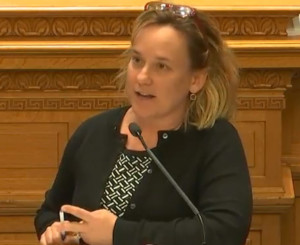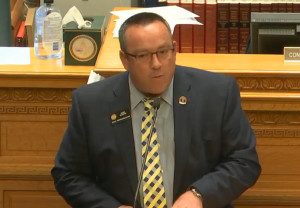DENVER — With just two days remaining in the 2017 legislative session, a last-minute hail Mary was thrown and caught.
Senate Bill 17-267 passed on third reading in the Senate and then out of House Finance and Appropriations committees and, finally, second reading on the House Floor, all within 14 hours.
Enough time remains on the clock to get the bill into the Governor’s hands before session ends on Wednesday.
Known as the Sustainability for Rural Colorado Act, supporters celebrated bipartisanship, while opponents remained frustrated with both fellow party members and their belief that the bill is unconstitutional.
Second reading passage in the House didn’t come until the bill was laid over three times during a three-hour stretch and in the early morning hours of Tuesday.
Sen. Tim Neville, (R-Littleton) said during his time in the legislature he has seen a lot of last-minute, large, complicated bills. This one, he said, is right up there with the best — or worst — of them.
“I can safely say, the ones that actually passed, often graded poorly after the dust settled and we had chance to see the flaws and unexpected consequences,” Neville said on the Senate floor Monday morning. “But I’m not sure I’ve ever seen anything like Senate Bill 267.”
The bill replaces more than $500 million in reduced funding to hospitals that was written into the long-bill to balance the budget, and helps fund schools, roads and hospitals in rural communities.

House Majority Leader, KC Becker, (D-Boulder), said those cuts were some of the hardest ever made and that this bill would make that right again.
“I don’t think any Republican except Rep. Rankin, voted for that bill,” Becker said, “because none of us want to see that kind of money taken out of our rural or any of our hospitals. (This bill) is a solution for you.”
SB 267:
- Reverses the funding reduction to hospitals.
- Moves the Hospital Provider Fee (HPF) to an enterprise fund.
- Puts $2 billion into Certificates of Participation (COPs) for capital construction and transportation.
- Creates a business personal property tax credit for small business.
- Provides extra money for rural schools.
- Requires all state agencies to submit a plan for a 2 percent budget reduction.
- Protects senior homestead exemption.
“So there is a lot in this bill because it took a lot to bring people on,” Becker said.
However, the HPF and COP parts of the bill are the big issues that have driven a wedge between Republican caucus members.
“A bill that attempts to cure problems in transportation, capitol construction, maintenance, education, tax policy and also rural hospitals,” Neville said. “All in (72) pages of a strike below introduced in the last five days of the legislative session.”
Neville said it stretches the boundaries of the single-subject legislative laws, the Taxpayer’s Bill of Rights (TABOR) and the Colorado Constitution.
The bill passed third reading with the help of eight Senate Republicans: Randy Baumgardner (who represents most of the mountain communities), Don Coram (who represents much of southwestern Colorado), Larry Crowder (who represents much of southeastern Colorado), Bob Gardner (El Paso), Kevin Priola (Adams), Jerry Sonnenberg (who represents much of northeastern Colorado), Jack Tate (Arapahoe), and Senate President Kevin Grantham (who represents a portion of Colorado mountain communities).
House Republicans spent the rest of the day Monday, arguing Neville’s points, both in committee and on the floor.
The HPF, which is assessed on all hospitals, is a varied amount for every night someone sleeps in a hospital bed. The revenue is then used to reimburse hospitals to sustain and expand Medicaid programs and for the Colorado Indigent Care Program.
For the past two years, Democrats have tried to convert the fee, which currently goes into a segregated cash fund, to an enterprise fund. Because it generates more than $800 million a year in revenue, it causes the state to hit its revenue cap under TABOR. For the past couple of years, taxpayers have received refunds because of the excess.
If it were converted, it would no longer fall under TABOR. Instead, a 13-member board appointed by the Governor, would control what is equal to about 10 percent of the state’s total expenditures. The conversion would free up space under the cap, allowing the state to collect more and spend more.
The COPs allow the state to mortgage existing buildings and then lease them back from a third party on a year-to-year basis until the mortgage is paid off. Opponents to COPs argue they create new debt against the intent of TABOR. If the state can’t, or won’t, budget the payment for the debt, the state loses the building.
Others argued the bill had so many changes and so many conjunctions it was far from single-subject. A provision in the constitution says to avoid the use of the words “and” or “or,” which suggest more than one choice or subject.
“Our constitution is pretty clear,” Rep. Tim Leonard (R-Jefferson) said. “We need to be a single-subject bill. I would suggest we are creating a dangerous precedent here that incorporates so many things to make so many people happy.”
Leonard read from Section 21 of the Constitution.
“A bill to contain but one subject,” he read. “No law shall be passed except by bill, and no bill shall be so altered or amended on its passage through either house as to change its original purpose.”
SB17-267 as passed was 72 pages of strike below text, which is an amendment to a bill that eliminates everything below the bill’s enacting clause and replaces it with all new text.
In other words, “Be it enacted by the General Assembly of the State of Colorado” is the only thing that remains from the original version.
“These provisions appear to place clear and strict limits on the types of extraneous amendments that may be added as the bill moves through the legislative process,” Leonard said. “It’s to avoid logrolling, which is joining together unrelated measures to gain votes for the passage of a measure.”
The Democrat controlled House passed the bill on second reading just after 1 a.m. Tuesday. It will be up for third reading on Wednesday, the final day of the 2017 session.
It didn’t pass without three delays and several attempts at amendments, which would have killed the bill because there wouldn’t have been enough time to return the bill to the senate.

Rep. Hugh McKean, (R-Loveland) said it was time for lawmakers to put their money where their mouth is. He proposed an amendment that would have added $2 billion more, and sent the bill to the voters for approval.
“I’ve been calling this bill the everything in the kitchen sink bill,” McKean said. “The kitchen sink in this bill is transportation, looking back at our voters and saying we actually did what we said we were going to do. … This comes out of the ability of being able to bond out projects that we’ve all talked about, which we’ve all agreed about, which are bonds that are approved by the voters rather than Certificates of Participation.”
Rep. Clarice Navarro, (R-Pueblo) said the bill wasn’t perfect, and she didn’t like all aspects of the bill, but Navarro said she could live with prioritizing rural health care and rural schools as well as the accountability for state offices and small steps toward Medicaid reform the bill offers to get this bill passed.
“This bill gets us closer to than we have been all session to a place that protects and supports rural Colorado,” Navarro said. “This bill addresses the needs of Rural Colorado in a way that I can live with at this time.”


